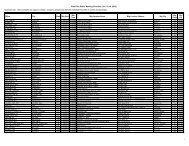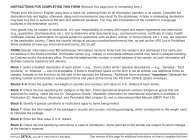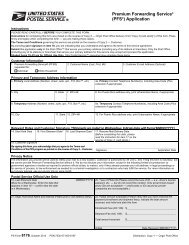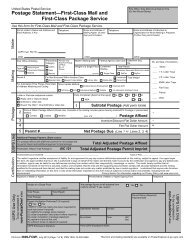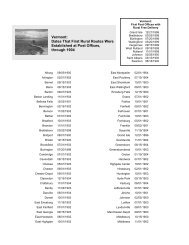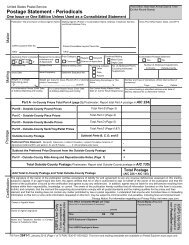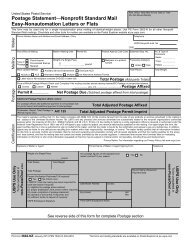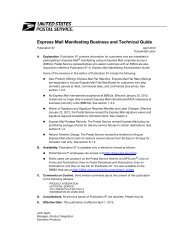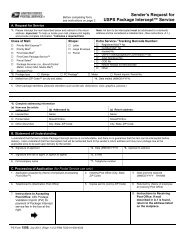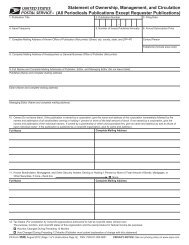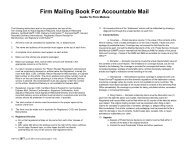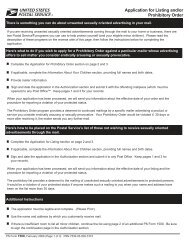Postal Bulletin 22144 - December 23, 2004 - USPS.com
Postal Bulletin 22144 - December 23, 2004 - USPS.com
Postal Bulletin 22144 - December 23, 2004 - USPS.com
Create successful ePaper yourself
Turn your PDF publications into a flip-book with our unique Google optimized e-Paper software.
POSTAL BULLETIN <strong>22144</strong> (12-<strong>23</strong>-04)<br />
27<br />
Community Relations Publicity Kit<br />
Black History Month/Marian Anderson<br />
In that era, American classical musicians rose in professional stature at home by studying and performing<br />
in Europe. Anderson made her first journey to Europe in late October of 1927. In 1930, she was<br />
awarded a fellowship that allowed her to study in Berlin. Her time abroad was immensely important to her<br />
emotional and artistic growth, enabling her to deepen her understanding of the languages she sang, to<br />
make professional connections, and to escape many of the constraints of Black life in America.<br />
After American producer Sol Hurok heard Anderson sing in Paris, he began to represent her in the<br />
United States, where his business practices effectively made her the equal of white concert artists. On <strong>December</strong><br />
30, 1935, he presented Anderson at Town Hall in New York. The concert was a grand success<br />
and a New York Times critic hailed Anderson as “one of the great singers of our time.”<br />
Aware of Anderson’s growing reputation, President Franklin Delano Roosevelt invited her to sing for<br />
guests at a White House dinner party in 1936. Eleanor Roosevelt subsequently praised Anderson’s performance<br />
in a newspaper column.<br />
Three years later, Mrs. Roosevelt again wrote in connection to Anderson after a group to which she belonged,<br />
the Daughters of the American Revolution (DAR), refused to make its Washington venue, Constitution<br />
Hall, available for Anderson’s Easter concert due to a “white artist only” policy. The First Lady left the<br />
group, and on Easter Sunday 1939, Anderson gave a historic and highly symbolic performance outdoors<br />
before 75,000 people at the Lincoln Memorial. She presented a varied repertoire, including “America,”<br />
Schubert’s “Ave Maria,” and a group of spirituals. Her performance was broadcast on radio nationwide.<br />
Anderson became the first Black singer to appear on the stage of New York’s Metropolitan Opera when<br />
in January 1955 she sang the role of the sorceress Ulrica in Verdi’s “Un Ballo in Maschere.” The following<br />
year, she published a successful autobiography, My Lord, What a Morning.<br />
As she neared the twilight of her musical career, Anderson became more active in politics. She performed<br />
at an inaugural ceremony for President Dwight D. Eisenhower’s second term and for the inauguration<br />
of President John F. Kennedy. The State Department named her a goodwill ambassador to Asia; in<br />
1958, she was appointed a delegate to the thirteenth session of the United Nations.<br />
At the historic March on Washington for Jobs and Freedom in August 1963, Anderson again sang at<br />
the Lincoln Memorial. The following <strong>December</strong>, she was awarded the Presidential Medal of Freedom.<br />
Anderson won the United Nations Peace Prize in 1977, and her 75th birthday was marked by a gala<br />
concert at Carnegie Hall, where she received New York City’s Handel Medallion and a congressional resolution<br />
of congratulations delivered by First Lady Rosalyn Carter. Many more honors were bestowed upon<br />
Anderson including the Eleanor Roosevelt Human Rights Award, and in 1991, she received a Grammy<br />
Award for Lifetime Achievement.<br />
Anderson died April 8, 1993, in Portland, OR, where she had moved to be with her nephew.<br />
# # #




